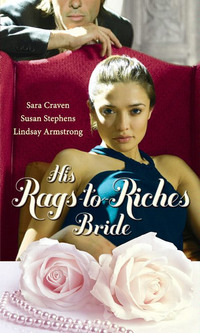
Полная версия
When The Devil Drives

When the Devil Drives
Sara Craven

www.millsandboon.co.uk
Former journalist SARA CRAVEN published her first novel ‘Garden of Dreams’ for Mills & Boon in 1975. Apart from her writing (naturally!) her passions include reading, bridge, Italian cities, Greek islands, the French language and countryside, and her rescue Jack Russell/cross Button. She has appeared on several TV quiz shows and in 1997 became UK TV Mastermind champion. She lives near her family in Warwickshire – Shakespeare country.
Table of Contents
Cover
Title Page
About the Author
CHAPTER ONE
CHAPTER TWO
CHAPTER THREE
CHAPTER FOUR
CHAPTER FIVE
CHAPTER SIX
CHAPTER SEVEN
CHAPTER EIGHT
CHAPTER NINE
Endpage
Copyright
CHAPTER ONE
‘SIMON, YOU DON’T—you can’t mean this! It’s a joke, isn’t it—one of your appalling, tasteless bloody jokes?’
Simon Chalfont’s face reddened, and his glance shifted away from the anguished appeal in his sister’s eyes.
‘I’m totally serious, old girl.’ He sighed. ‘God, Jo, if I could change things, I would. But you weren’t here, and the bank wouldn’t lift a finger to help me. I was desperate.’
‘So you’ve mortgaged us—this house—the workshop—the little we have left—to Cal Blackstone.’ Joanna Bentham’s hands gripped the back of the chair as if it were the only reality in a suddenly tottering world. ‘I can’t believe it. I can’t credit that you’d do such a thing.’
‘And what was I supposed to do?’ Simon demanded defensively. ‘Lay the men off? Close the workshop? Try and sell this house?’
‘If you were so strapped for cash, surely there are other sources you could have borrowed from in the short term?’
‘A loan shark, perhaps,’ Simon suggested derisively. ‘For God’s sake, Jo, do you know the kind of interest those people charge?’
‘I know the kind of interest Cal Blackstone could charge.’ Joanna drew a shaky breath. ‘Simon, don’t you realise what you’ve done? You’ve sold us lock, stock and barrel to our greatest enemy!’
‘Oh, I knew that was coming.’ Simon flung himself on to the sofa, giving his sister a trenchant look. ‘Don’t you think it’s time we grew up and forgot all about this ridiculous family feud? Isn’t carrying the thing into a third generation going over the top?’
‘Ask Cal Blackstone,’ Joanna bit back at him. ‘He hasn’t forgotten a thing. Fifteen years ago, his father took the mill away from us. Now his son’s coming for the rest. And, thanks to you, he hasn’t even had to fight for it.’
There was a sullen silence.
Joanna released her grip on the chairback, rubbing almost absently the indentations the heavily carved wood had left in her flesh.
Cal Blackstone, she thought, and her skin crawled. The grandson of the man who was once glad to work for my grandfather as an overlooker at the mill. The trouble-maker, the rabble-rouser who tried to close our doors with strikes over and over again. The self-made millionaire who drove Chalfonts to the edge of bankruptcy, and died swearing he’d put us out on the street.
Even after the fierce old man had gone, there was no respite for the beleaguered mill. His son Arnold had proved just as inimical, just as determined. In the end Chalfonts had had to be sold, and there was only one bidder.
Arnold Blackstone got it for a song, Joanna thought, anger welling up inside her. Chalfonts, who’d been making quality worsteds on that site for over a hundred years. And he made it a byword for cheap rubbish, aimed at the bottom end of the market.
The only thing remaining from the old days was the name—Chalfonts Mill—kept deliberately by the Blackstones, Joanna’s father had said bitterly, as a permanent thorn in the family’s flesh—a constant and public reminder of what they’d lost.
Now, under the direction of Cal Blackstone, his grandfather’s namesake, the mill, as such, no longer existed. The looms had been sold, and the workforce dispersed, and the vast building had become a thriving complex of small industrial workshops and businesses.
Because Cal Blackstone wasn’t interested in quality or tradition. He was an entrepreneur, a developer of property and ideas. Local gossip said there was hardly a pie in a radius of two hundred miles that he didn’t have a finger in. And what he touched invariably turned to gold, Joanna reflected, wincing inwardly. He’d already more than doubled the fortune his father and grandfather had left, and at thirty-three years of age it was reckoned his career had barely even started.
To the outrage of the local landowners, he’d acquired Craigmoor House and its park, which had been derelict for years, renovated it completely, and, in the face of strenuous opposition, turned it into a country club, with an integral restaurant and casino, and a challenging nine-hole golf course in the reclaimed grounds.
Within a year, all those who’d been most vociferously outspoken against the plan were among the club’s most stalwart members.
But the Chalfonts were not among them. Since the original breach between the first Callum Blackstone and Jonas Chalfont, all those years ago, the families had never knowingly met under the same roof. The Chalfonts had let it be known that they would accept no invitations which had also been extended to any member of the Blackstone clan, and the rule had been rigorously applied by Cecilia Chalfont, Joanna’s mother, who came from an old county family and carried considerable social clout.
The two families had still been at daggers drawn when Cecilia had died from an unexpected heart condition while Joanna was in her early teens.
I’m almost glad, Joanna thought fiercely, walking to the window and staring down at the formal rose garden, glowing with summer bloom, which it overlooked. At least Mother was spared the knowledge of this—betrayal by Simon. But keeping it from Dad will be another matter.
Anthony Chalfont had his own suite of rooms on the first floor. Severely crippled by arthritis, he rarely ventured forth from them, but was looked after devotedly by his manservant Gresham, and Joanna’s own elderly nanny.
Just recently, her father’s mind had begun to wander, and he seemed to prefer to dwell very much in the past. A couple of times since her return, Joanna had found herself being addressed by him as Cecilia, although she could see little resemblance in herself to her mother’s haughty beauty. But there were other days too when his brain was as sharp and lucid as it had ever been. If Cal Blackstone turned them out of their home, the effect on her father might be disastrous.
She took a deep breath. ‘Tell me again—slowly—what happened. How you came to do this thing. After all, when I went away the workshop seemed to be doing well. The order-book was full.’
‘It was.’ Simon’s shoulders were hunched, his whole attitude despondent. ‘Then everything started to go wrong. Two of our biggest customers gave us backword. They said the recession was biting, and the property market was going into decline. They reckoned people weren’t prepared to spend that kind of money on handcrafted furniture and kitchens any more. We were left with thousands of pounds’ worth of specially designed gear on our hands.’
‘And what about our partner, Philip the super-salesman?’ Joanna asked. ‘What was he doing about all this?’
Simon shrugged. ‘Philip tried to find other markets, but the answer was always the same. Property development was being cut back, and prices kept down. They wanted mass-market stuff people could afford in their show houses.’
Joanna bit her lip hard. It was Philip who’d urged expansion, she thought angrily. Philip who’d persuaded Simon to take on more men, and buy more machinery to fulfil a demand he was confident he could create. In vain, she’d argued that small was beautiful, that they should concentrate on quality rather than quantity, and feel their way cautiously for a while until their markets were firmly established.
But Simon hadn’t wanted to listen. He’d wanted to make money fast, and restore the shaky Chalfont fortunes. He’d also wanted to marry Philip’s pretty sister Fiona, so anything Philip suggested was all right with him.
And at first their growth had been meteoric, just as Philip had predicted. Simon and Fiona had been married with all the appropriate razzmatazz, and the couple had moved into Chalfont House. The Craft Company had continued to flourish, and, although Joanna’s instincts had still warned her that they should be cautious, she was having deep problems of her own, and her involvement in the business was becoming less and less.
I should have stayed here after Martin died, she thought with a small silent sigh. I shouldn’t have run away like that. But I felt I needed time—to lick my wounds—to try and heal myself. There were too many memories here. Too much I needed to forget.
Her headlong flight, after her husband’s funeral, had taken her to her godmother’s home in the United States. Aunt Vinnie had extended the invitation in a warmly affectionate letter of condolence as soon as she’d heard about Martin’s fatal car accident. Joanna hadn’t planned on staying more than a few weeks in New Hampshire, but had become interested in spite of herself in the running of the art gallery Aunt Vinnie owned. She’d started helping out for a few hours each week, but had soon grown more deeply involved, and gradually her stay had extended into months.
If her godmother hadn’t reluctantly decided to sell up and retire to California, she had to admit she might still have been there.
Clearly, eighteen months had been a long time to absent herself. Too long, she castigated herself.
‘We had suppliers to pay, and the wages bill to meet,’ Simon went on. ‘Things were looking really black. The bank refused outright to allow us to exceed our stated overdraft. In fact, they started pressing us to repay some of it. Jo—I didn’t know where to turn.’
She didn’t look at him. She continued to stare rigidly down into the garden. ‘So you turned to Cal Blackstone. Why?’
‘It wasn’t quite like that.’ The defensiveness was back in his voice. ‘He approached me. He was the guest speaker at the Round Table dinner, and the people I was with asked him to join us afterwards for a drink. I couldn’t very well avoid him. We were left on our own, and at first he just—made conversation.’
‘But later?’ Joanna asked matter-of-factly.
‘Later—he began to talk about the Craft Company. He seemed to know we were in trouble. He said that things were generally difficult for small businesses, and mentioned a few of the problems some of them were having at Chalfont Mill. He said he’d been able to help in a lot of cases. That it would be a pity to go under, if a simple injection of cash could save the day.’
‘Cal Blackstone, philanthropist.’ Joanna gave a mirthless laugh. ‘And you fell for it!’
Simon came to stand beside her. ‘What else was I supposed to do?’ he almost hissed. ‘Things were bad and getting worse every day. Our creditors were pressing, and the bank was threatening to bounce the wages cheque. If someone offers you a lifeline, you don’t throw it back in his face, for God’s sake.’ He paused. ‘Besides, Fiona had just told me she was pregnant.’
With her usual immaculate sense of timing, Joanna thought resignedly. ‘So how much did you borrow from him?’
‘Twenty thousand to begin with. The rest, later.’
‘Using your power of attorney from Dad to put this house up as collateral, I suppose.’
‘We had to do something,’ Simon said stiffly. ‘And Phil’s flat is only rented.’
‘Lucky Philip! I hope he’s got a spare room. You and Fiona are probably going to need it. And the baby when it arrives, of course,’ she added, her mouth twisting. ‘Have you warned your wife she may shortly be homeless? Not to mention Dad, of course.’
Simon looked at her uneasily. ‘Why should it come to that?’
‘Because—to quote the words from his letter of today’s date—Mr Blackstone wishes to meet you to discuss the extent of your liabilities to him.’ She was silent for a moment, then said abruptly, ‘He’s closing in for the kill, Si. He means to finish what his father and grandfather began. The old man swore he’d see our family on its knees when Grandpa fired him, and turned him out of his cottage all those years ago. Cal Blackstone means to fulfil that pledge.’ She shook her head. ‘It’s as well I came back when I did. I would have hated to return and find all my clothes and other possessions dumped outside on the lawn by the present Mrs Blackstone.’ She paused again. ‘I presume there is one by now?’
‘No one official,’ Simon said moodily. ‘He’s apparently still quite happy to play the field, lucky bastard.’
Joanna bit her lip. She had only been at home for a week, but it was already clear to her that Fiona was not enjoying her pregnancy, and resentment of her condition was making her querulous and demanding. Joanna, torn between the amusement and irritation which her blonde, brainless sister-in-law usually aroused in her, had decided immediately that the prudent course would be to leave the couple to paddle their own rather shaky canoe in privacy.
She had just made arrangements to view a cottage which had come on to the market in the neighbouring valley when Simon had dropped his bombshell about Cal Blackstone’s loan.
Blind instinct told her to proceed with her own plans. To walk away from Simon and the mess he’d created, and let him sort it out for himself, while she began to rebuild her life at a safe distance from Chalfont House, the mill, and everything and everyone concerned with it.
But it wasn’t as simple as that. Simon had been hard hit by Cecilia’s death, and although Joanna was four years his junior she’d learned, in its aftermath, to mother him with almost fierce protectiveness. She couldn’t simply abandon him to his fate now.
The dizzy Fiona would be no help, she thought ruefully, totally preoccupied as she was by nausea and vague aches and pains all over her body. And Joanna was still a partner in the Craft Company, although admittedly she’d taken little active part in the running of the business since her marriage.
She had forgotten Simon’s propensity for taking the easy way out of any difficulty, she thought, with an inward sigh.
‘So when are you planning to see him?’ she asked quietly.
‘He’s coming here tomorrow afternoon.’
‘Here?’ Joanna stared at him, appalled. ‘Why not at the Craft Company?’
Simon shrugged, his expression pettish. ‘It wasn’t my choice. When I telephoned him, his secretary simply gave me the appointment. There was no consultation about it. She just told me what time he’d be arriving.’
‘I can believe it,’ Joanna said grimly.
It was the first time a Blackstone had ever set foot in Chalfont House, she realised with a sense of shock. And, if there was anything she could do, it would also be the last.
She said, ‘We’ll have to try and fend him off, Simon.’
‘How?’
Joanna considered for a minute. ‘Well—Martin left me some money, not all that much, admittedly, but it’s a start, and there’s the commission Aunt Vinnie paid me at the gallery. I saved most of it. If we can keep him at bay for a few weeks with that, we might be able to raise the rest of the capital elsewhere.’
‘Do you think I haven’t tried?’ He shook his head. ‘I’ve done everything I can think of. I tell you, Jo, it’s hopeless.’
‘No!’ Joanna said fiercely. ‘There is hope—there’s got to be. He’s not going to take everything away from us.’
‘Perhaps he doesn’t want to,’ Simon suggested hopefully. ‘You are rather taking his intentions for granted, you know. Condemning him without a hearing.’
Joanna gave him a level look. ‘I have no illusions about Cal Blackstone, or his intentions.’ She glanced at her watch. ‘Isn’t it time you were getting off to the workshop?’
‘Hell, yes. But I’d better pop up and see Fiona first. She didn’t have a particularly good night.’
Poor old Si, Joanna thought as her brother left the room, his brow furrowed with anxiety. Fiona’s vagaries were just one more problem for him to worry over. Troubles never seemed to come singly these days.
She moved over to the sofa and plumped up the cushions which Simon had crushed. As she straightened, she looked up at the big portrait of Jonas Chalfont which hung over the ornate mantelpiece. A harsh face looked down at her, its expression arrogant and dominating, thick grey brows drawn together over his beak of a nose.
She took a breath. The portrait had been painted in her grandfather’s heyday, when the Chalfont family were a force to be reckoned with in the Yorkshire woollen industry. Master of all he surveyed, she thought wryly, studying the sitter’s proud stance.
It had been soon after the portrait had been finished, however, that Jonas had sacked Callum Blackstone following a violent argument, and evicted him and his small son from their tied cottage. Holding the frightened child in his arms, as bailiffs dumped their possessions into the street, Callum had publicly sworn revenge.
‘As you’ve taken from me, Jonas Chalfont, I’ll take from you,’ he’d declared, standing bareheaded in the rain. ‘Aye, by God, down to every last stick and stone!’
And nothing’s gone right for us since, Joanna thought wearily. Oh, Grandfather, you didn’t know what you were starting.
Know your enemy, had been one of Jonas’s favourite maxims, but he had totally underestimated his former overlooker’s sheer force of will and determination to succeed. Just as Simon had failed to assess Cal Blackstone’s deviousness of purpose in offering to help the Craft Company financially.
But then Si had never taken the family feud too seriously anyway, Joanna recalled.
‘Isn’t it time we started to live and let live?’ he’d demanded angrily when Joanna had flatly refused to attend a dinner party to which Cal Blackstone had also been invited.
‘Not as far as I’m concerned,’ Joanna had returned with a toss of her tawny hair. ‘If people invite that man, they needn’t bother to ask me as well.’
But, as she’d grown up, she’d found it was well-nigh impossible to avoid Cal completely. The Chalfonts were no longer the powerful social mentors they’d once been, and Cal, single, wealthy and darkly attractive, was a welcome visitor to every household in the area except theirs.
Joanna had found to her exasperation that to keep out of Cal Blackstone’s way entirely was to risk social isolation. More and more she’d found herself running into him at point-to-points, parties and charity functions. To her annoyance, she’d actually been introduced to him a number of times by a series of well-meaning people who clearly shared Simon’s view that it was time a truce was called in this family war.
But none of these people had been hounded and cheated by the Blackstones, Joanna thought violently. To them, Cal Blackstone was simply a charming young man, if a trifle sardonic, who drove a series of fast cars, dated all the most attractive girls in the West Riding, and could always be relied on for a hefty donation to any good cause. No one cared any more about past rights or wrongs, it seemed.
And once she and Cal Blackstone had been formally introduced, he took pains to remind her of the fact by seeking her out to greet her at every encounter. In fact, Joanna decided, he took an unpleasant delight in forcing himself on her notice, engaging her in conversation, and even inviting her to dance.
And the fact that she had ignored all his overtures and was never anything but icily civil in return seemed only to amuse him.
If she continued to keep him rigidly at a distance, eventually he would get tired of his cat-and-mouse games with her, she’d assured herself.
But she’d been wrong about that—totally wrong. Which was why she knew, none better, just what Cal Blackstone’s real motives were, and exactly what he had planned for the remaining members of the Chalfont family.
She shivered, wrapping her arms defensively across her body, as she made herself relive once more in nerve-aching detail that rain-washed autumn afternoon on the high moor road above Northwaite when she’d discovered for herself how ruthless, how relentless an enemy he was …
‘Damnation!’ Joanna stared down at the offside wheel of her Mini, her heart sinking. ‘Of all times to get a flat tyre!’ she muttered to herself, as she went to find the jack.
The rain was sweeping in sheets across the Northwaite valley below, and the hills were dankly shrouded in low cloud and mist.
By the time she’d fetched the jack, and squatted uncomfortably in the road beside the car, the rain had plastered her tawny blonde hair to her skull, and droplets of water were running down her forehead into her eyes, so that she had to pause every few seconds and brush them away.
She’d never had to change a tyre before, and she realised, to her shame, that she only had the haziest idea of how to go about it. Watching other people was not the same as personal experience, she decided wretchedly, as the jack stubbornly refused to co-operate with her efforts to fix it in place.
Send me someone to help this time, she bargained silently with her guardian angel, and I promise I’ll sign on for a course in car maintenance this winter.
The thought had barely formed in her mind when the sleek grey Jaguar materialised silently out of the mist and slid to a halt behind her. She looked round eagerly, planning some self-deprecating, humorous remark about her predicament. Then the relieved smile died on her lips as she realised her rescuer’s identity.
‘Having trouble?’ Cal Blackstone asked pleasantly, as he emerged from the driver’s seat, shrugging on a waterproof jacket.
‘I can manage, thanks,’ Joanna said shortly. It occurred to her that her guardian angel must have a totally misplaced sense of humour.
‘Then this must be a new method of wheel-changing of your own devising,’ he said urbanely, folding his arms across his chest, and draping his tall, lean, elegant length against his own vehicle. ‘How fascinating! I hope you’ll allow me to watch.’
Apart from striking him down with a convenient boulder, or even the recalcitrant jack, Joanna could see no method of preventing him. Seething, she gritted her teeth and soldiered on. It was raining harder than ever now, and the damp was beginning to penetrate right through her layers of clothing to her skin, making her feel clammy and uncomfortable.
‘You don’t seem to be getting on very fast,’ the hated voice commented at last.
‘I don’t like having an audience.’
‘I can believe you don’t like having me as an audience.’ She wasn’t looking at him, but there was something in his voice that told her he was grinning. ‘Come on, Miss Chalfont, why don’t you swallow your damned pride and say, “Help me”?’
‘I didn’t ask you to stop.’
‘You wouldn’t ask me to throw you a rope if you were drowning. As you probably will if this rain keeps up—that, or die of pneumonia.’ He walked to her side, put his hand under her elbow and yanked her to her feet, without ceremony.
‘Leave me alone!’ She wrenched herself free of his grasp.
‘Willingly—once this wheel of yours is changed.’ He was fitting the jack into place with a deft competence that made her want to kill him and dance on his grave. ‘Go and sit in my car, and dry yourself off a little,’ he directed over his shoulder. ‘If you look in the sports bag on the back seat, you’ll find a towel.’
Instinct prompted her to reply haughtily that she preferred to remain where she was, but common sense intervened, reminding her that in this weather she would simply be cutting off her nose to spite her face, and that she was only laying herself open to further jibes.









